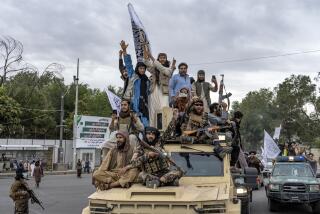Italy recognizes rebels as Libya’s government
- Share via
Reporting from Tripoli, Libya — Italy on Monday formally recognized the rebel government of eastern Libya, dealing yet another blow to the embattled regime of Col. Moammar Kadafi.
Italian Foreign Minister Franco Frattini said Rome would open an office in rebel-held territory and formally recognize the Benghazi-based Libyan National Council as the only representative of the country, which Italy once ruled as a colonial ward and to which it maintains deep cultural and economic ties. Italy joins France as the second Western country to formally recognize the rebel government.
Frattini said the Tripoli government had lost its legitimacy and any solution for the future of Libya had the condition that Kadafi and his family had to leave Libya. He rejected the regime’s attempts to wiggle its way diplomatically out of its worst crisis after failing to gain a decisive victory on the battlefield or emerge from international isolation.
Photos: A close call near the front line in Libya
Abdelati Obeidi, serving as Libya’s acting foreign minister, is on a diplomatic mission through Greece, Malta and Turkey, shopping around proposals to halt strong U.N. sanctions and end an international bombing campaign against Kadafi’s troops.
“These proposals are not credible,” Frattini said, adding, “Nothing was said about the departure of K, which is ... a precondition.” Frattini met Monday with Libyan opposition representative Ali Issawi.
Kadafi’s violent suppression of protests against his four-decade rule sparked a civil war that has divided Libya into a rebel-held east and a western region controlled by Kadafi loyalists. The U.N. authorized a no-fly zone and airstrikes on Kadafi’s forces as they were about to pounce on the rebel stronghold of Benghazi last month.
But after advancing against Kadafi’s forces with the aid of airstrikes, rebels were beaten back and are now locked in a battlefield stalemate at Port Brega. With the armed conflict proving inconclusive, rebels and Kadafi’s forces have sought to broaden their diplomatic contacts in recent days.
Obeidi, serving in a post vacated after the apparent defection last week of longtime Kadafi right-hand man Musa Kusa, offered counterparts in Athens proposals to end the conflict late Sunday.
“On our part, we underlined, we reiterated the clear message of the international community: full respect and implementation of the U.N, resolutions, immediate cease-fire, to end violence and hostilities, particularly against civilians in Libya,” Greek Foreign Minister Dimitris Droutsas was quoted as saying by the official Athens News Agency. “Judging from the emissary’s words, it seems that the regime is also searching [for] a solution.”
Western newspapers reported Monday on an apparently dormant proposal by Kadafi’s son Seif Islam Kadafi, in which he would take over from his father and implement some democratic political reforms. But the plan, first murmured about before the airstrikes began, had already been rejected by rebels as well as world leaders.
“Kadafi and his sons have to leave before any diplomatic negotiations can take place,” rebel spokesman Shamseddin Abdulmelah in Benghazi was quoted as saying by Agence France-Presse.
Kadafi himself may also not be willing to give up power. A Kadafi government spokesman last week rejected as “impossible” a modest rebel offer for a truce in exchange for refraining from attacking opposition-held cities, as demanded by a U.N. Security Council resolution, and allowing peaceful protests.
More to Read
Sign up for Essential California
The most important California stories and recommendations in your inbox every morning.
You may occasionally receive promotional content from the Los Angeles Times.










